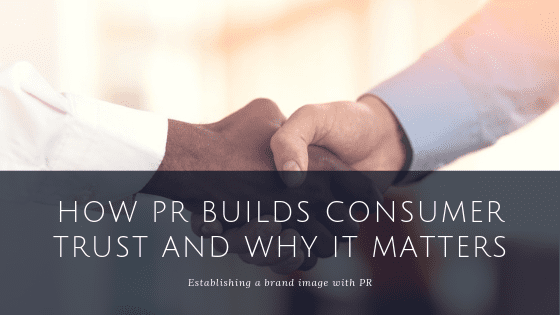The internet age has brought with it a wave of transparency, and many companies have had to rethink their public relations strategies. Consumers are now turning towards brands with products that have a driving mission behind them and can be trusted.
When purchasing a product, 70% of consumers consider a business’ commitment to social initiatives. Therefore brands must do more than offer a product to build consumer trust. The PR industry has grown by 30% in the last five years. It is clear that more companies are looking to control their image and use it to build trust among their patrons.
Successful PR campaigns can reap enormous rewards for a company. Cancer Research transformed the #nomakeupselfie viral phenomenon into something of their own. Helping raise over $10 million in 6 days and creating long term interest in the charity.
We talk about the PR trends to look out for this year.

Poorly run campaigns, which consumers see as fake or false can cause a severe backlash. Sony created a phoney fan site to raise the profile of the PSP. It ended in disaster as genuine fans realized the site was owned by a viral marketing company and eroded trust in the brand.
How PR builds trust
PR builds trust by generating buzz around a brand. It puts a product in the news so that there is a buzz around the brand. Typically PR can be split into three categories: earned, paid, and owned. A company has complete control over owned PR and partial control over paid PR. The trickiest, but most trustworthy and lucrative category, is earned.
Earned PR
Earned PR comes from word of mouth surrounding a brand and the conversations that consumers are having. Third party validation is essential for a brand to build a lasting and trustworthy relationship with consumers. Genuine reviews on industry blogs or customer testimonials are fantastic in helping generate an organic buzz around a product or brand.


However, consumers are becoming aware of companies who are trying to artificially generate hype. For example, Chipotle pretended to have been hacked in an attempt to gain an audience and was widely discredited. The need for validation from sources from outside a brand or company has increased dramatically.
Customer reviews
More than 83% of consumers will check online reviews before buying a product because it increases the reliability of a purchase. Consumer trust in a brand tends to be higher as customer reviews are genuine and outside the control of a company. Also, as Youtube’s popularity continues to soar, video review formats are becoming increasingly popular.
Online reviews from blogs also usually have the bonus of providing a link to the website of the product. These backlinks are a fantastic way for businesses to improve their rankings on the search engine results page. This helps create brand trust and awareness, as the first page of Google captures up to 92% of all web traffic.
Also, sites like Tripadvisor and Amazon have made it easy for customers to leave reviews about a business or product. Customers are also eager to view a business’ response to reviews as it gives them an insight into the company culture and approach.
Using social media
The explosion of social media and the rise of the “influencer’ has given businesses a fantastic opportunity to reach consumers indirectly and build consumer trust. When done tactfully using influencers can have profound effects. H&M used influencers who represented the companies style, to successfully launch their Fall Studio Collection.
Social media influencers have rapidly become a critical public relations tool, and 60% of PR executives believe they will play a vital role in future PR efforts.
Why this matters
Consumers are more likely to trust a balanced story from a neutral source than a carefully crafted message from a brand. Consumer trust is an essential element for the purchasing process and is more likely to ensure the long-term success of a brand.
When a consumer trusts a brand, they are more likely to be loyal to it. Loyalty is hard to buy. Retaining customers is far cheaper than acquiring new ones, and it can be the key to profitable growth, which is essential for the long run.


As well as benefiting a brand, earned PR, in particular, is fantastic for the consumer. Before review sites, people had to rely solely on word of mouth and were far less confident when making a purchase. Customers will now read an average of 10 reviews before buying a product. Meaning they are far more informed, less likely to experience buyers remorse, and have increased trust in the brand.
We explore how businesses should measure PR.
Companies used a range of PR techniques to deliver their message to consumers and attempt to build long-lasting trust. A successful PR campaign can have an incredible influence on a company’s long term image. Technology has enabled consumers to sit in the driving seat and steer a brands message. For consumers, this is important because it has given them the power and means companies have to be genuine in their PR efforts.
If you’re curious to learn more about public relations or want to speak to a SYNC consultant about starting your brand’s PR journey, contact us at [email protected]

